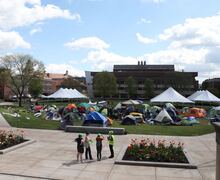Take advantage of environmentally-focused resources at Syracuse University
Will Fudge | Staff Photographer
This Earth Week, SU students should increase their sustainability efforts by taking environmental courses and volunteering for sustainable student organizations.
In response to a growing need to reduce its climate and environmental impact, Syracuse University has grown its sustainability-focused resources and opportunities. In the dining halls on campus, students can find locally sourced foods, less single-use food packaging and recycling and composting stations. Additionally, SU has increased its dependence on renewable energy sources and strengthened its sustainability department.
Despite sustainability efforts on campus, students are not immune to the causes and effects of climate change and pollution. Students contribute to unsustainable industrial habits, including fast fashion and factory farming, and they need to take action against waste. While SU still has work to do to mitigate its contributions to environmental degradation and climate change, the university has provided students with a plethora of opportunities to take action and learn more about the environment.
In 2009, SU released its Climate Action Plan laying out the steps and actions to achieve carbon neutrality by 2040 and to reduce its environmental impact as a community. As a part of this plan, the school launched a Sustainability in the Curriculum Task Force aimed at expanding the school’s environmentally focused academics.
The plan is also expanding upon sustainability initiatives that students can partake in. At the time of the plan’s creation, the SU’s course catalog offered over 150 classes with an environmental component to students. Today, class titles focused on the environment range from Sustainability Science and Policy to Religion, Spirituality, and Nature. Beyond academics, students have access to sustainability-focused opportunities through extracurriculars.
Extracurricular organizations have developed sustainability initiatives where students can take action on environmental issues. The sustainability management team, which SU created with its climate plan in mind, offers Pete’s Giving Garden which promotes local food systems in collaboration with Hendricks Chapel and recently launched its affiliation with Bee Campus USA by installing beehives on South Campus. Students can participate in both by navigating SU’s sustainability website, which also features other sustainability resources.
Activities such as Earth Day cleanups and the Student Association’s director of sustainability position are examples of environmentalism at SU. With a student body of over 20,000, these resources can lead to the collective action needed to create substantial change.
Environmental issues at SU will continue if students do not increase their support for sustainability efforts on campus Programs aimed at supporting sustainability efforts exist across campus curricula and in student organizations. Consider registering for environmentally conscious courses and volunteering in these student organizations. These opportunities can be a great way for students to build a more sustainable society.
Harrison Vogt is a junior environment sustainability policy and communication and rhetorical studies dual major. His column appears biweekly. He can be reached at [email protected]. He can be followed on Twitter at @VogtHarrison.
Published on April 20, 2022 at 9:20 pm





